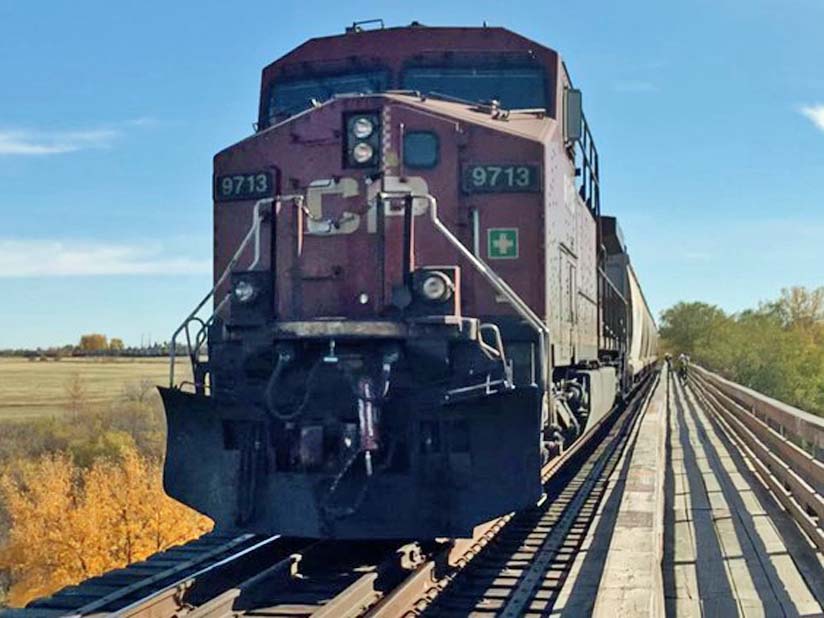
Regina Saskatchewan - In some ways, it's a big thing.
In other ways, not so much, just another small part of a huge court proceeding.
But it's also a grand, but eventually futile, attempt to cover up the fact that the Saskatchewan government might have shot itself directly in its own legal
foot.
It's a little tangly, but here's the background, Canadian Pacific Railway (CP) and the Saskatchewan government are locked in a lawsuit over taxes.
The railway is suing for the return of some $341 million it has paid to the Saskatchewan government, taxes that it says it shouldn't have paid due to a tax
exemption put in place by contract in 1880, and carried through to present times in Section 24 of the Saskatchewan Act.
Fair enough.
As is often the case, the provincial response was basically, prove it.
Prove everything.
Or, as the judge in the case, Justice Keith Kilback, put it quite succinctly, "In its amended statement of defence, Saskatchewan denies the 1880 Contract
is part of the Constitution of Canada. In the alternative, Saskatchewan pleads that Clause 16 of the 1880 Contract was rescinded in 1966."
Problem is, a resolution that the government put forward in the legislature said something quite different.
The provincial government put the resolution forward, a resolution that was unanimously supported by the way, to get rid of that troublesome section of the
Saskatchewan Act, which is now part of the Canadian Constitution.
As the province's justice minister, Gordon Wyatt, puts it, "the government believes it's time to repeal section 24 regardless of whether it's in force or
not."
The resolution said, "Now therefore be it resolved by the Legislative Assembly of Saskatchewan that the Constitution of Canada be amended as follows,
Amendment to the Constitution of Canada, 1. Section 24 of the Saskatchewan Act is repealed.
2. The repeal of section 24 is deemed to have been made on 29 Aug 1966 and is retroactive to that date."
The problem is, on the face of it, the province's own resolution pretty much admits that the tax exemption exists and undercuts its defence in the
lawsuit.
The railway company, as can be imagined, was quite interested in that official statement of the government's position.
So much so that its legal team moved to have the resolution, and the portion of Hansard (the official verbatim record of the legislature) for that day, entered
as evidence in the case.
Here's the judge, "CPRC argues that Hansard and the journal of Votes and Proceedings it seeks to introduce into evidence contradict Saskatchewan's
pleaded defences regarding the existence and constitutionality of Clause 16 of the 1880 Contract."
Not so fast, the government said.
Using its own words in the case would violate the privileges of members of the legislature, even if the government's own words seem to make mincemeat of its
defence in the case.
Here's Judge Kilback again, describing the Saskatchewan government's attempt to stuff the resolution cat back into a bag, "Saskatchewan argues that
proceedings in the Legislative Assembly cannot be used for evidentiary purposes in the civil courts. It says that admitting these two documents into evidence
would infringe the freedom of speech of members of the Legislative Assembly, which is one of the parliamentary privileges enjoyed by members and the
Legislative Assembly as a whole."
Well. Imagine that.
Legislators do get a kind of protection ordinary citizens don't, legislators can't be sued for what they say in the legislature, or have action taken against
them generally, a process designed to allow them to speak freely (originally, to protect them from action by the Crown).
But does that apply to publicly made legislative resolutions?
Nope.
Judge Kilback ruled there was no privilege involved.
Will it matter in the end?
Probably not, if the federal government agrees to the solution the Saskatchewan government wants, cancelling CP's special tax deal by changing the Canadian
Constitution, and backdating that change to 1966.
But it's interesting a government would think it has the right to be protected from any legal repercussions when it says one thing in court, and something
completely different in the legislature.
Russell Wangersky.
(there was no image with original article)
(usually because it's been seen before)
provisions in Section 29 of the Canadian
Copyright Modernization Act.
